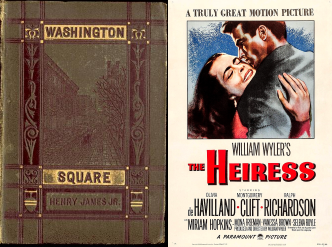Arguably, this story is about the importance of showing affection to your child in order to build their confidence. You read a lot of stories from this era where the mother has died in childbirth and the child is left to fend for—usually—herself because the father is so bitter over the loss of the mother that he can’t bear to look at the child. In this case, if the father had shown care and affection to the child, and treated her like her own person, and complimented her occasionally, she might have been able to recognize the fortune hunter for herself. And even if, for some reason, she still wanted to marry the fortune hunter, she’d be going into it with her eyes open.
We start with the novel Washington Square, by Henry James. It is about a house in, shockingly enough, Washington Square, in Manhattan. The wealthy Dr. Sloper is also a widower. His son died at age three; his wife gave birth a second time, to a daughter, Catherine, and died two weeks later. The girl was raised by her neglectful father, who sees her only as a poor replacement for her mother, and a flighty aunt. As an adult, she is quiet, reserved, and in her father’s opinion neither very bright nor very attractive. At her cousin’s engagement party, she meets her cousin’s fiancé. He begins courting her, possibly in pursuit of her fortune instead of her.
In the movie, she’s Olivia de Havilland, for some reason Hollywood’s go-to choice for plain characters. Her father is Ralph Richardson. Morris Townsend is Montgomery Clift, and Aunt Lavinia Penniman is Miriam Hopkins. It’s yet another of de Havilland’s costume pieces, though much of it takes place quietly within rooms. The drama is inside the characters’ heads and hearts, not in burning cities or ships at sea. It’s a gentle movie where much of the drama is on de Havilland’s face.
Eventually, Catherine berates her father for his cruelty to her, and it’s true that he does not think of himself as being cruel until just before that moment. He’s been clear that he doesn’t like Morris, and he tells Mrs. Penniman that he’s sure Morris is after Catherine’s fortune—which works out to over a million dollars a year in today’s money. Eventually, he has an argument with Catherine about it, and he does it in the worst way possible, telling her that the only thing she has to recommend her is her fortune and no one would want her without it.
I mean, maybe it’s true. James never really contradicts the idea, though it’s clear from the first few pages that Dr. Sloper has only ever liked one woman, Catherine’s mother. If Catherine isn’t like her mother, her father thinks she’s inferior. Different is not an option. Would Catherine flourish in a better environment? It’s impossible to say. It’s clear she has no role models worth emulating in the household. She has another aunt, but that aunt has a family of her own. No one has been bothering to find out who she is and help her be her best self. She’s not her mother, so her father doesn’t care, and Mrs. Penniman is a flake who doesn’t worry much about what’s best for Catherine.
Would it be in Catherine’s best interest to marry Morris, whether he’s a fortune hunter or not—and James is less clear on that point than the movie—just to be married? Well, that’s the question, isn’t it? The answer now is a lot more clear. It’s nearly a century and a half since the book was written, seventy-five years since the movie. Catherine could have her own life if she wanted to, or marry a woman if that’s what she wanted to, or go online and find someone more to her tastes. Or just have a roommate so she didn’t live alone. A woman today has options that a woman in 1880 did not.
There’s more to the story, but that’s what I keep going back to. Maybe it’s the look on Olivia de Havilland’s face when she confronts Ralph Richardson with his cruelty. And she doesn’t mean telling her that she’s got nothing to recommend her. She means how he’s treated her for her entire life. She wears a cherry-red dress to the party that starts everything off because she knows it was her mother’s favourite colour, and her father’s only reaction is to tell her that she doesn’t look as good in it as her mother did. What a horrible man.
Next month, we’ll be getting into something actually recent—and therefore where I’ll probably have to buy the book and it seems will have to rent the movie—with Naomi and Ely’s No-Kiss List. Help fund the article by supporting my Patreon or Ko-fi!

